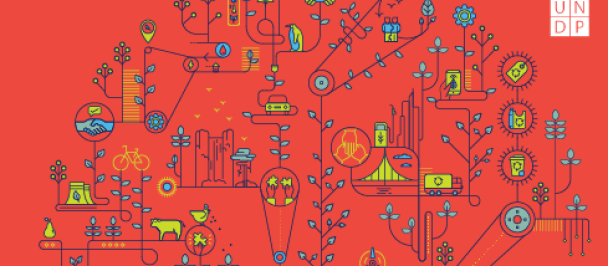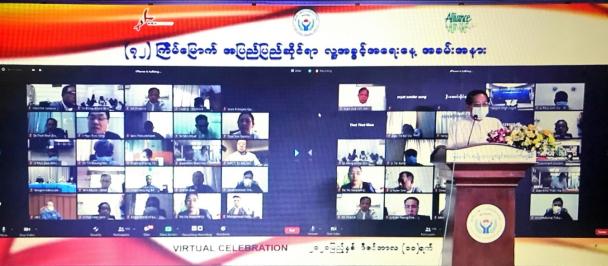- 2 million USD announced to be invested in Myanmar’s mangrove sustainable management, restoration and protection for the next two years
- UN-REDD’s new initiative will support Myanmar in meeting its Nationally Determined Contributions by helping to cut greenhouse gas emissions
- Mangroves are a priority for the country’s reforestation and restoration programme
1 October 2020, Bangkok/Naypyidaw – The UN-REDD Programme has announced a USD 2 million project supported by the Government of Norway that will help make mangrove sustainable management, restoration and protection an integral part of Myanmar’s efforts to reduce its greenhouse gas (GHG) emissions as part of their Nationally Determined Contributions (NDCs).
The “Integrating mangroves into REDD+ Implementation in Myanmar” initiative, announced today at the 3rd Mekong Mangrove Forum, focuses on tackling Myanmar’s destruction and degradation of mangrove ecosystems. This will help the country reach its climate mitigation targets within its NDCs and support livelihoods of mangrove forest communities.
Myanmar is home to the third most extensive area of mangrove ecosystems in Asia. Mangroves’ capacity to absorb huge amounts of GHGs from the atmosphere makes them a critical resource for climate mitigation. They also provide essential ecosystem services, such as providing a habitat to commercial fish species and coastal protection. But Myanmar has been subject to one of the world’s highest rates of mangrove clearance, with annual losses estimated at 2.2 percent of their total area between 2000-2014, as mangroves have been converted for agriculture, city expansion, and economic development.
The “Integrating mangroves into REDD+ Implementation in Myanmar” initiative aims to build on Myanmar’s recent efforts to reduce net greenhouse gas emissions by focusing on the role of mangroves in achieving the goals of the national REDD+ strategy.
”Conservation and restoration of mangroves are important elements of Myanmar’s efforts in Integrated Coastal Management and actions to reduce emissions and increase resilience to climate change impacts as part of the Myanmar Climate Change Strategy and Action Plan and the national REDD+ Strategy,” says Nyi Nyi Kyaw, Director General of Myanmar’s Forest Department. “This new UN-REDD project will assist us in ensuring that these efforts are sustainable in the long term and contribute to the fulfilment of Myanmar’s Nationally-Determined Contributions to the Paris Agreement.”
The project will run in six districts that make up for more than half of the country’s mangrove area. It will support the Government of Myanmar to improve its forest governance, develop a new, reliable system to track mangroves’ carbon content for the national Greenhouse Gas Inventory, include local communities in decision-making, and tailor REDD+ interventions to local and national contexts.
The 2-year programme is implemented by the Forest Department of Myanmar and the UN-REDD Programme, a United Nations climate change partnership between the Food and Agriculture Organization of the United Nations (FAO), the United Nations Development Programme (UNDP) and the United Nations Environment Programme (UNEP), with financial support from Norway's International Climate and Forest Initiative (NICFI).
“The three agencies will work in close synergy, drawing on their complementary technical capacities to achieve concrete results in terms of sustainable management, restoration and conservation of mangroves in Myanmar, and thus contribute substantially to the mitigation of climate change,” says Ben Vickers, Regional Programme Officer on REDD+ for FAO.
About UN-REDD
The UN-REDD Programme was launched in 2008 and supports nationally led REDD+ processes with the aim of accessing results-based payments. It promotes the informed and meaningful involvement of all stakeholders, including indigenous peoples and other forest-dependent communities, in national and international REDD+ implementation. The Programme builds on the convening role and technical expertise of the Food and Agriculture Organization of the United Nations (FAO), the United Nations Development Programme (UNDP) and the United Nations Environment Programme (UNEP).
About REDD+
Reducing emissions from deforestation and forest degradation (REDD+) is a mechanism developed by Parties to the United Nations Framework Convention on Climate Change (UNFCCC). It creates a financial value for the carbon stored in forests by offering incentives for developing countries to reduce emissions from forested lands and invest in low-carbon paths to sustainable development. Developing countries would receive results-based payments for results-based actions. REDD+ goes beyond simply deforestation and forest degradation and includes the role of conservation, sustainable management of forests and enhancement of forest carbon stocks.
About Mangroves
Mangroves form the foundation of a highly productive and biologically rich ecosystem which provides a home and feeding ground for a wide range of species, many of which are endangered. Although mangroves make up less than one percent of all tropical forests worldwide, they are highly valuable ecosystems, providing an array of essential goods and services which contribute significantly to the livelihoods, well-being and security of coastal communities.
For media interviews and press matters concerning the project, please contact:
UN-REDD Programme Regional Communications and Knowledge Management
Alexandra.popescu@un.org

 Locations
Locations


